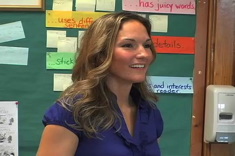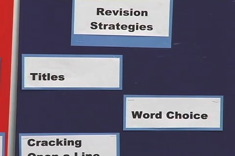With the beginning of a new school year fast approaching many classroom teachers find themselves reflecting on what worked and didn’t work when launching the previous year’s writing workshop. Everything I have ever read about writing workshop emphasizes the need to invest the time those first four to six weeks establishing routines and to stick with all of those procedural mini-lessons (no matter how much it feels like you are not getting to the craft lessons that you know build stronger writers).
I’d like to share with you what I refer to as writing workshop teacherisms to keep tucked in the back of your mind as you launch this year’s workshop. These teacherisms will help you establish some common language during your workshop, and by introducing them from the start they can become a natural part of your workshop. Some of them you may be familiar with — I can’t claim to have come up with them on my own, but during a recent writing workshop graduate course I was teaching we compiled a working list and the teachers appreciated them.
- “Today I’m going to teach you . . .” We all know the power of establishing a clear purpose for learning with students, so I can’t think of a better way than to begin every mini-lesson with this teacherism. If students don’t know what we are going to teach them, we can’t expect them to invest their energy in what we have to share.
- “Looks like . . . sounds like . . . feels like . . . I work with two second-grade teachers who are masters at establishing with their students what writing workshop should look like, sound like, and feel like. When the time comes to address a management issue with students (for instance volume during independent writing and conferring time), these teachers address their students and ask them what that time should look like, sound like, and feel like. The students then self assess and take responsibility for getting things back on track. It’s not the teacher telling them how things should look, sound, and feel, but the students deciding so they can live like writers.
- “I notice . . .”Very often students are apprehensive about talking during a writing conference. “I notice . . .” is one way to provide praise at the onset of a conference as well as an opportunity for the teacher to do a quick assessment and take notice of what the student is doing in the piece of writing. Students don’t always know what to say about their writing, so if we can help them out by telling them something we notice they have a head start. This opener may lead them to other things they would like to discuss with us during the conference.
- “What are you doing/trying today as a writer?” I like this teacherism for initiating a conference with a student. If my mini-lesson emphasized craft or a new writing strategy, I use this version of the question. Other times simply asking what they are doing as a writer indicates to the student that I want to hear from them. Often I might follow up this initial teacherism with, “Is there something we can work on together today?” This helps me move into the zone of individual instruction. By asking the student what we can work on together, I provide the student with ownership of what I teach in the conference. I may have my own agenda, and know that a student really needs my help with a specific skill. But for optimal learning during that writing conference, I need to give students an opportunity to express what they want to learn.
- “Teach the writer, not the writing.” I think this is my favorite teacherism of all. It’s not exactly one that I use with students, but one that I tell myself all of the time. As teachers of writing, we have to remember that it is not about the piece of writing a student is working on, it’s about teaching the writer a skill, strategy, or technique that they can employ to all of their writing, “Today and every day of their writing lives.” If, “Today I’m going to teach you . . .” is how you start your mini-lesson, then be sure to send your kids off by reminding them that what you taught them is something they should do, “Today and everyday of their writing lives.”






